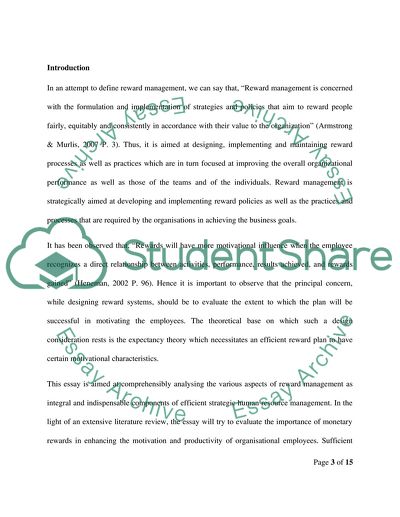Cite this document
(Effective Reward Management as Part of Strategic Human Resource Research Paper - 1, n.d.)
Effective Reward Management as Part of Strategic Human Resource Research Paper - 1. Retrieved from https://studentshare.org/human-resources/1733237-some-hr-managers-assume-that-money-is-the-most-effective-reward-strategy-for-increasing-the-motivation-and-productivity-of-all-their-employees-to-what-extent-do-you-agree-or-disagree-with-this-statement
Effective Reward Management as Part of Strategic Human Resource Research Paper - 1. Retrieved from https://studentshare.org/human-resources/1733237-some-hr-managers-assume-that-money-is-the-most-effective-reward-strategy-for-increasing-the-motivation-and-productivity-of-all-their-employees-to-what-extent-do-you-agree-or-disagree-with-this-statement
(Effective Reward Management As Part of Strategic Human Resource Research Paper - 1)
Effective Reward Management As Part of Strategic Human Resource Research Paper - 1. https://studentshare.org/human-resources/1733237-some-hr-managers-assume-that-money-is-the-most-effective-reward-strategy-for-increasing-the-motivation-and-productivity-of-all-their-employees-to-what-extent-do-you-agree-or-disagree-with-this-statement.
Effective Reward Management As Part of Strategic Human Resource Research Paper - 1. https://studentshare.org/human-resources/1733237-some-hr-managers-assume-that-money-is-the-most-effective-reward-strategy-for-increasing-the-motivation-and-productivity-of-all-their-employees-to-what-extent-do-you-agree-or-disagree-with-this-statement.
“Effective Reward Management As Part of Strategic Human Resource Research Paper - 1”, n.d. https://studentshare.org/human-resources/1733237-some-hr-managers-assume-that-money-is-the-most-effective-reward-strategy-for-increasing-the-motivation-and-productivity-of-all-their-employees-to-what-extent-do-you-agree-or-disagree-with-this-statement.


